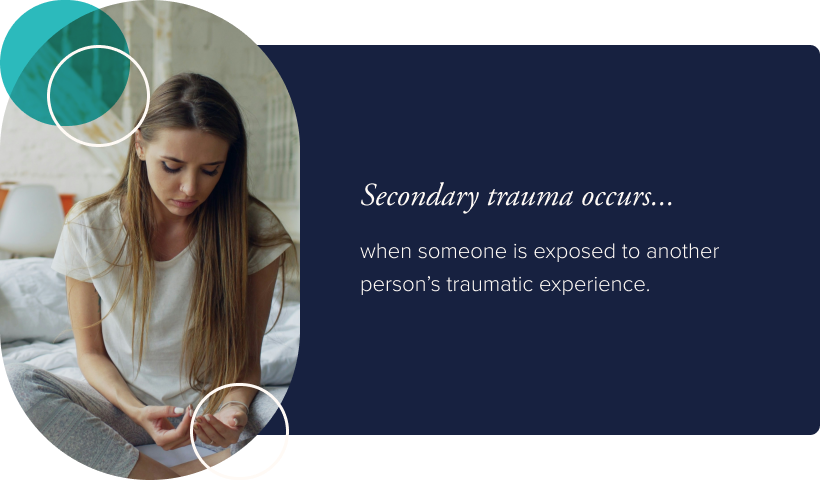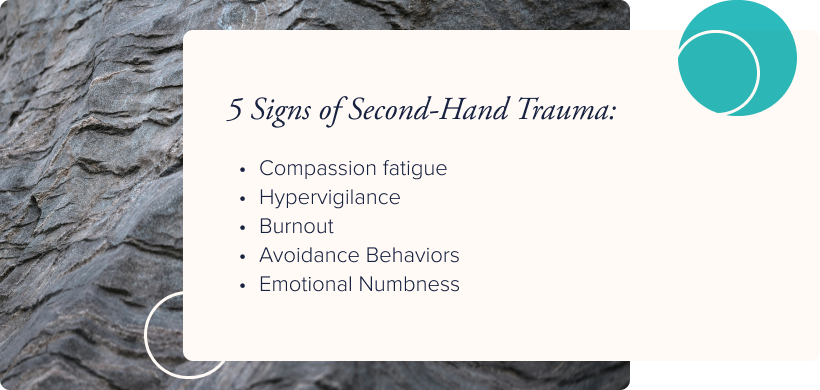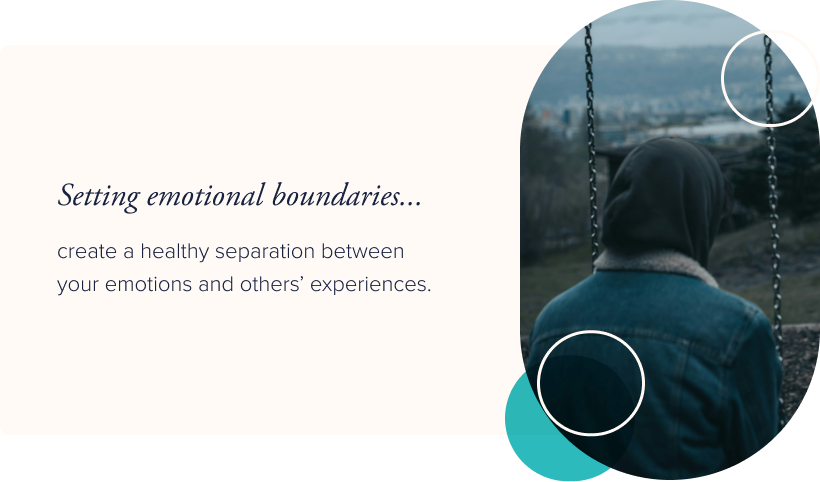
What Is Second-Hand Trauma?

One-on-One Counseling in Arizona for Life's Challenges
Every day is a chance to start over. Our trauma-informed therapists will meet you where you are — in person or online — so you can process your experiences and become the person you want to be.
Did you know that trauma can be contagious? That’s right, even without experiencing the traumatic event for yourself, you can still be affected by it.
Trauma doesn’t always come from a personal experience. Sometimes, simply witnessing or hearing about someone else’s trauma can take a significant toll on you too. This is called second-hand trauma, and it’s a very real phenomenon that can happen without you even realizing it.
In this guide, we’ll take a look at what second-hand trauma is, common signs to look for, and how to resolve it.
What Is Second-Hand Trauma?
Second-hand trauma, also known as secondary trauma or vicarious trauma, is a unique form of trauma that spreads from one person to another. It occurs when someone is exposed to another person’s traumatic experience, which causes them to develop trauma symptoms of their own.
How Does Someone Get Second-Hand Trauma?
Someone can get second-hand trauma from supporting or caring for people who are affected by trauma. This can happen by listening to their story, witnessing their pain, or empathizing deeply with what they went through.
Certain occupations, such as healthcare providers, mental health professionals, and first responders, carry a higher risk of developing second-hand trauma. These professionals are regularly exposed to other people’s suffering, which makes them much more susceptible to absorbing trauma.
At Inner Balance, our trauma-informed therapy ensures that each and every client gets personalized, compassionate, and effective treatment.

Do I Have Second-Hand Trauma?
There’s always a chance of experiencing second-hand trauma when you care for and support someone through their traumatic event. Although it manifests differently from person to person, here are some common signs to look for.

Compassion Fatigue
Compassion fatigue is a form of emotional exhaustion that can make someone feel irritable, numb, and unable to feel empathy towards others. While it’s particularly common in those who work with trauma victims, it can happen to anyone who spends too much time taking on other people’s pain.
Related Article: How to Deal With Compassion Fatigue
Hypervigilance
After being exposed to other people’s trauma for a long time, it can start to feel like the world is a dangerous and threatening place. This can eventually lead to hypervigilance, which is a constant state of fight or flight where your brain is always on alert for potential threats.
Burnout
When you support others through their trauma, you drain your own mental and emotional batteries to charge theirs. If you don’t take time to rest and recharge, you’ll run out of energy completely and have nothing left to give. This is when burnout sets in, and it leaves you feeling overwhelmed, exhausted, and disconnected from the world around you.
Related Article: What Is and Isn’t Burnout?
Avoidance
Avoiding certain people, places, or situations is a natural response to feeling overwhelmed by trauma. It’s the mind's way of protecting itself from experiencing more trauma, and you might find yourself steering clear of anything that triggers memories of other people’s pain.
Emotional Numbness
Sometimes, second-hand trauma can make you feel emotionally flat or disconnected. You might notice that it’s harder to feel any emotion, whether it’s happiness, sadness, anger, or love. When you spend a lot of emotional energy empathizing with others, you don’t have much left over for yourself.
We offer EMDR therapy that helps you reprocess distressing memories and limit the impact of underlying trauma on your mental and emotional health.
How to Resolve Second-Hand Trauma
Just like with other forms of trauma, healing from secondary trauma is possible. It can be a gradual process, but over time, you’ll be able to support others through their trauma without sacrificing your own mental and emotional health.
Here are a few strategies that can help you resolve second-trauma and care for yourself while you care for others.
Set Emotional Boundaries
Setting emotional boundaries means limiting how much of others’ emotions or problems you take on. The main goals of setting emotional boundaries are to understand your limits, recognize when you’re taking on too much, and create a healthy separation between your emotions and others’ experiences.
This can be difficult at first, especially if caring for others is a major part of your job or daily life. While you may not be able to limit your exposure to other’s trauma, you can limit the emotional investment that you give them. When you notice that you’re giving beyond your limits, take a mental step back to ground yourself and recharge your emotional battery.

Practice Self-Care
When you spend a lot of time caring for others, it can feel like you don’t have the time or energy to care for yourself. This cycle of self-neglect is what opens the door to burnout, emotional numbness, and compassion fatigue.
Practicing self-care helps you live a healthy, balanced life while still being able to show up for others. To do this, make sure you exercise regularly, get plenty of rest, and spend time doing activities you enjoy. You can also practice mindfulness and grounding techniques like yoga, meditation, and journaling to restore your mental and emotional health.
Related Article: Daily Self-Care Ideas
Seek Support and Therapy
When the weight of secondary trauma feels overwhelming and inescapable, it’s a sign that you may need additional support. Trauma is a heavy burden to carry alone, but seeking professional support can ease that weight and help you begin the healing process.
Trauma-informed therapists specialize in supporting people who are affected by trauma. They can help you understand how trauma is affecting your life and teach you strategies for coping with it in a healthy, productive way.
At Inner Balance, all of our counselors are able to deliver trauma-informed care and are eager to help you feel better.
You Are Not Alone
Many people who struggle with second-hand trauma don’t want to share their burden and may feel reluctant to reach out for help. Don’t let this be you. Professional support is available to help you live the life you deserve. At Inner Balance, our trauma-informed therapists are here to help you reclaim your life from trauma. Reach out today to connect with a mental health professional and start your path towards healing and balance.
Related blog articles
Sign up for our newsletter
Sign up with your email address to receive news and updates.
Get started
Request a consultation

-03%201.png)




